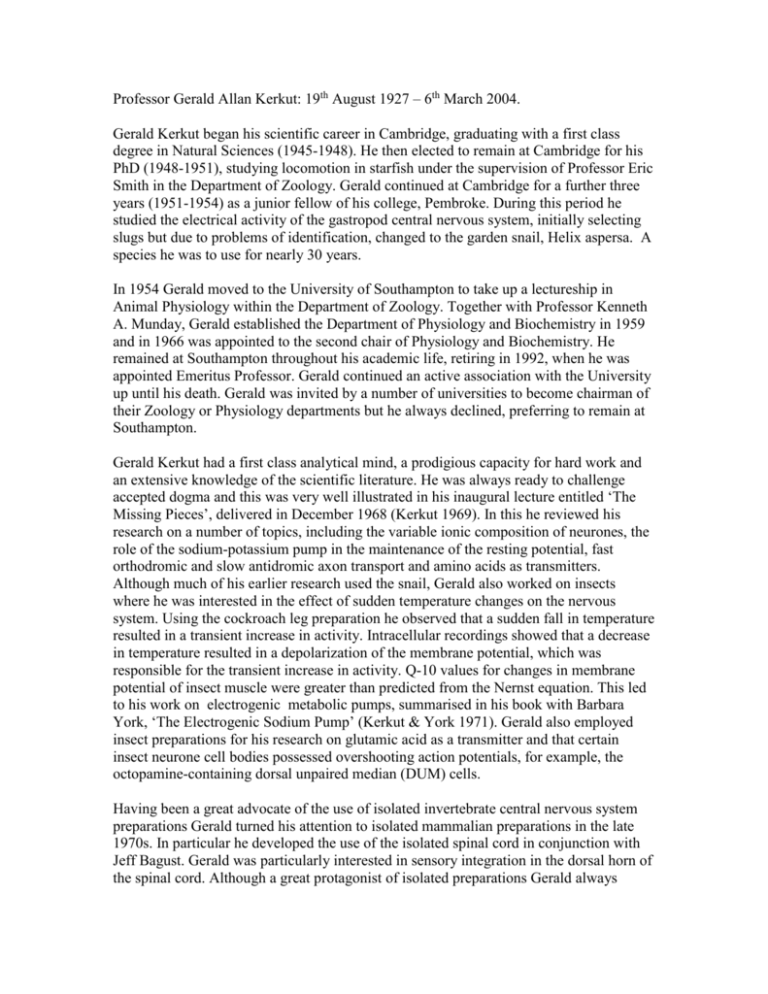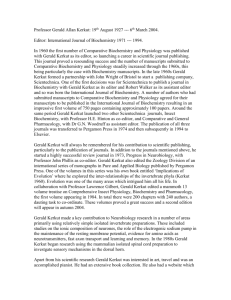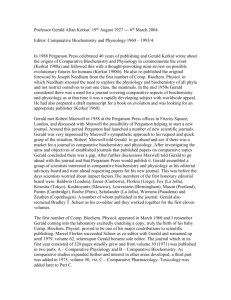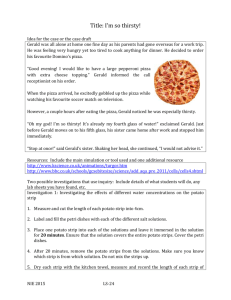Professor Gerald Allan Kerkut: 19th August 1927 – 6th March 2004
advertisement

Professor Gerald Allan Kerkut: 19th August 1927 – 6th March 2004. Gerald Kerkut began his scientific career in Cambridge, graduating with a first class degree in Natural Sciences (1945-1948). He then elected to remain at Cambridge for his PhD (1948-1951), studying locomotion in starfish under the supervision of Professor Eric Smith in the Department of Zoology. Gerald continued at Cambridge for a further three years (1951-1954) as a junior fellow of his college, Pembroke. During this period he studied the electrical activity of the gastropod central nervous system, initially selecting slugs but due to problems of identification, changed to the garden snail, Helix aspersa. A species he was to use for nearly 30 years. In 1954 Gerald moved to the University of Southampton to take up a lectureship in Animal Physiology within the Department of Zoology. Together with Professor Kenneth A. Munday, Gerald established the Department of Physiology and Biochemistry in 1959 and in 1966 was appointed to the second chair of Physiology and Biochemistry. He remained at Southampton throughout his academic life, retiring in 1992, when he was appointed Emeritus Professor. Gerald continued an active association with the University up until his death. Gerald was invited by a number of universities to become chairman of their Zoology or Physiology departments but he always declined, preferring to remain at Southampton. Gerald Kerkut had a first class analytical mind, a prodigious capacity for hard work and an extensive knowledge of the scientific literature. He was always ready to challenge accepted dogma and this was very well illustrated in his inaugural lecture entitled ‘The Missing Pieces’, delivered in December 1968 (Kerkut 1969). In this he reviewed his research on a number of topics, including the variable ionic composition of neurones, the role of the sodium-potassium pump in the maintenance of the resting potential, fast orthodromic and slow antidromic axon transport and amino acids as transmitters. Although much of his earlier research used the snail, Gerald also worked on insects where he was interested in the effect of sudden temperature changes on the nervous system. Using the cockroach leg preparation he observed that a sudden fall in temperature resulted in a transient increase in activity. Intracellular recordings showed that a decrease in temperature resulted in a depolarization of the membrane potential, which was responsible for the transient increase in activity. Q-10 values for changes in membrane potential of insect muscle were greater than predicted from the Nernst equation. This led to his work on electrogenic metabolic pumps, summarised in his book with Barbara York, ‘The Electrogenic Sodium Pump’ (Kerkut & York 1971). Gerald also employed insect preparations for his research on glutamic acid as a transmitter and that certain insect neurone cell bodies possessed overshooting action potentials, for example, the octopamine-containing dorsal unpaired median (DUM) cells. Having been a great advocate of the use of isolated invertebrate central nervous system preparations Gerald turned his attention to isolated mammalian preparations in the late 1970s. In particular he developed the use of the isolated spinal cord in conjunction with Jeff Bagust. Gerald was particularly interested in sensory integration in the dorsal horn of the spinal cord. Although a great protagonist of isolated preparations Gerald always stressed that observations using isolated preparations must always be related to the living animal. Gerald Kerkut was also very involved in the publication of scientific data both in terms of books and journals. In the late 1950s he met Robert Maxwell, the founder of Pergamon Press. They immediately formed an excellent rapport and Maxwell encouraged Gerald to explore his idea of starting a journal in comparative physiology and biochemistry. To cut a long story short this resulted in the publication of Comparative Biochemistry and Physiology with its first number in 1960 and Gerald as co-editor with Bradley T. Scheer. The journal proved a great success and eventually expanded into three sections, viz, Physiology, Biochemistry and Pharmacology. Gerald continued to edit the journal until 1994. Another of his editing successes was Progress in Neurobiology which he co-edited with John Phillis. Gerald also edited a very successful series of monographs in Zoology which were published by Pergamon Press. Gerald’s interest in publishing work on insects is illustrated by his co-editing with Lawrence Gilbert in 1985 of the first edition of Comprehensive Insect Physiology, Biochemistry and Pharmacology. He was particularly proud of the high standard of scholarship in these volumes. Gerald was always interested in evolution and with Maxwell’s support published ‘The Implications of Evolution’ in 1960 (Kerkut1960). In this he examined the problem of the evolution and interrelationships of the animal phyla. This was a topic of lasting interest to him and one to which he returned in a mini-review entitled ‘Possible Evolutionary Futures for Mankind’ (Kerkut 1988). In 1988 a Festschrift was organised in Gerald’s honour and the proceedings published as a special edition of Comp. Biochem. Physiol. Gerald provided the opening chapter in which he reviewed his research career up to that time (Kerkut 1989). Gerald Kerkut enjoyed music, art and travel. He was an accomplished pianist and had an extensive collection of art books. Up until 6-7 years ago Gerald travelled widely in the Americas and the Far East. Gerald enjoyed teaching and interacting with undergraduates and postgraduates. Many will retain enduring memories of his humour and concerned interest in their welfare. During his active research period Gerald trained over 80 postgraduates and their success will provide a lasting legacy to his memory. Kerkut, G.A. (1960) The Implications of Evolution; pp 174; Pergamon Press, Oxford, UK. Kerkut, G.A. (1969) The Missing Pieces; pp 15; University of Southampton, Southampton, UK. Kerkut, G.A. (1988) Possible Evolutionary Futures for Mankind. Comp. Biochem. Physiol. 90A, 5-10. Kerkut, G.A. (1989) Studying the Isolated Central Nervous System; A Report on 35 Years: More Inquisitive than Aquisitive. Comp. Biochem. Physiol. 93A, 9-24. Kerkut, G.A. & York, B. (1971) The Electrogenic Sodium Pump; pp182; Scientechnica, Bristol, UK.










